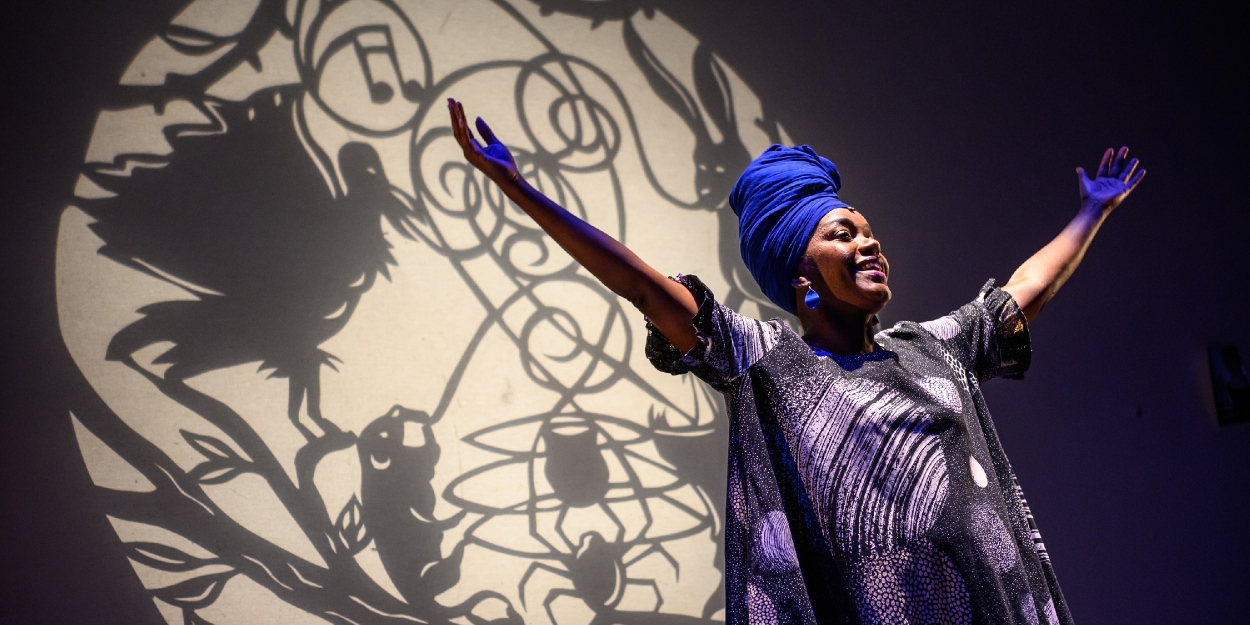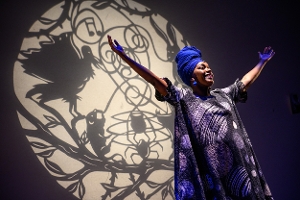Interview: Odile Gakire Katese on THE BOOK OF LIFE at McCullough Theatre
Transforming society through theatre and storytelling


Odile Gakire Katese, a Rwandan playwright, actor, director, and humanitarian, is known for her work in using theater and the arts to promote healing and reconciliation in her home country after the 1994 genocide. She is a remarkable Rwandan artist, playwright, and cultural entrepreneur known for her outstanding contributions to the fields of theater, literature, and cultural development. Her life and work have made a significant impact, both in Rwanda and internationally.
Katese's journey as an artist began with a deep passion for storytelling and a commitment to using the arts as a tool for social change and healing. She became a prominent figure in the Rwandan arts scene and gained recognition for her dedication to preserving and promoting Rwandan culture through her creative endeavors.
She is the recipient of numerous awards, including the League of Professional Theatre Women's Rosamond Gilder/Martha Coigney International Award and the Salzburg Global Seminar's Instrumental Value: The Transformative Power of Music Fellowship.
THE BOOK OF LIFE, coming to the McCullough Theatre on October 1st, is her story of the letters to, and love for, the people lost in the Rwandan genocide. Kiki recently answered some questions for us about her work and THE BOOK OF LIFE.
You’ve accomplished so much with your commitment to art and social change, including the Carnegie Common Ground Award. Can you share with us the moment or experience in your career that you feel most proud of?
In the last nineteen years, I’ve had so many moments and experiences to be proud of! Now, I am mostly proud of the fact that in July 2024, we will be celebrating the twentieth anniversary of Ingoma Nshya, the first-ever company of women drummers of Rwanda! I am proud of the six hundred girls we are currently training in ten primary and secondary schools in Huye district, in the Southern province of Rwanda.
I am proud of the first edition of Ingoma Nshya Festival that gathered two hundred and fifty of them on the 6th of may this year! That day, I was not the only one to be proud: there was so much pride in the eyes of local authorities, parents, trainers, teachers and directors of the schools involved. And the girls were so proud of themselves! I have to confess that it is such a privilege and a blessing to witness the rise of the second generation of women drummers! I always like to state that I am the mother of the woman drummer of Rwanda, but these days, I am happily claiming to be a very proud grandmother!
Finally, I am also proud that the Woman Cultural Centre has acquired plots in the Southern and Eastern province and is planning to build Arts Schools for Girls in the five provinces of Rwanda with the headquarters in Kigali City. After succeeding as a part of the cultural landscape of Rwanda, it is now crucial to grow roots in the architectural landscape, in order to achieve our goal of a culture that is also “made of us.”
Your work often explores the intersection of art, culture, and social change. How do you see the role of theater and storytelling in addressing important social issues and fostering community engagement?
Theatre and storytelling are the reflection and/or the imagination of a society and that’s why they have the power to transform it. Thus, the change we want to see has to be commonly dreamt and negotiated. That’s why diversity and equity in the stories we tell are essential. Everyone must be represented and each difference celebrated.
You are known for your dedication to promoting gender equality and empowering women through the arts. How do you envision the role of theatre and storytelling in advancing women’s rights and opportunities, both in Rwanda and globally?
Theater and storytelling should be gender responsive in Rwanda and all over the world. Girls and women should have the means and opportunities to write and tell their own stories. In our case, we are happy to set precedents and premieres. And, our twentieth anniversary is the perfect moment to document and immortalize our story of pioneers who paved the way for girls and women in the drumming arena.
We are very excited about our new show I HAVE A DRUM, an uplifting story about our dream of equality in gender.
Your journey from starting the first and only all-women drumming troupe in Rwanda to becoming a renowned playwright is truly remarkable. Can you share some insights into the creative process behind your plays and how your experiences have shaped your unique approach to storytelling?
Each time, I ask myself what is the contribution that I want to make? What light do I want to shed and on which topic? My approaches are always shaped by the circumstances in which I work, the people I meet and the challenges I face. As most of the time I got zero or very little funding, I quickly understood that my ideas had to be wonderfully simple. Isn’t God in the details? And here, the important detail is that my art has to be “made of me.”
It became quickly clear that for Ingoma Nshya to make sense, it could not be a one shot project. This is where I had to be even more creative: How do we sustain? How do we impact the drumming arena so that it becomes more inclusive? So, bridging the gender divide in all “arts of exclusion” (not only the drumming sector) and transforming them into “arts of inclusion” became my mission. Having girls massively invade warrior dance, dynastic poetry, songwriting, juggling and soon inanga (trough-zither), became a necessary step in growing a culture that is women-friendly.
THE BOOK OF LIFE is known for promoting healing in post-genocide Rwanda. Can you tell us more about the inspiration behind this project and any impact it has had on individuals and communities?
THE BOOK OF LIFE achieved these words I had previously written for another show: “I take a handful of the earth that covers you and infuse each speck with a breath of eternity…”
I was born in exile, in the Democratic Republic of Congo. I first came back to Rwanda two years after the 1994 genocide against the Tutsi. I started realizing that I had lost almost all the members of my bigger family: my grandpas and grandmas, uncles, aunts, cousins that I had never met. So, remembering them became a challenge: how do you remember someone you never met?
Every time I visited a memorial site, it devastated me to discover them in the position they died. As I needed to find them alive, somewhere, I asked widows, orphans, and perpetrators to write letters to them and this is how we started bringing them back to life.
Over four hundred people have written letters to say, “Is it true that you died?”, “Here is my telephone number, please call”, “Don’t worry, I have grown up”, “I long for you”, “Goodbye”, “I love you”, “It makes me happy to be told that I smile like you.”
THE BOOK OF LIFE is this never-ending conversation between life and death, a collection of infinite letters addressed to each and every victim, and in each page, we find them alive, we sing them, we archive their stories and their lives, so that they don’t vanish.
THE BOOK OF LIFE IS HERE FOR TWO PERFORMANCES ONLY
Odile Gakire Katese shows us the power of storytelling as a tool for hope and healing in the face of the most tragic of circumstances in THE BOOK OF LIFE, in Austin for two performances only.
As part of its Performance as Public Practice speaker series you can join the playwright Kiki Katese, for a discussion on Friday September 29th at 2pm on the UT campus Winship Building, 2.112. There's also the chance to join the company of THE BOOK OF LIFE for a drum circle Saturday at 2pm at the George Carver Museum, 1165 Angelina Street here in Austin. The Texas Performing Arts website tells us that at this event, "Kiki Katese and the Women Drummers of Rwanda are led by Austin artist Nailah Akinyemi-Sankofa. Area black women drummers are invited to bring drums, make music together, and share ideas about the rewards of overcoming life’s challenges through performing arts."
Presented by Texas Performing Arts at the McCullough Theatre on the UT campus, THE BOOK OF LIFE performances are at 2:00pm and 6:30pm on October 1st. For tickets and more information visit the Texas Performing Arts website.
Comments

Videos

